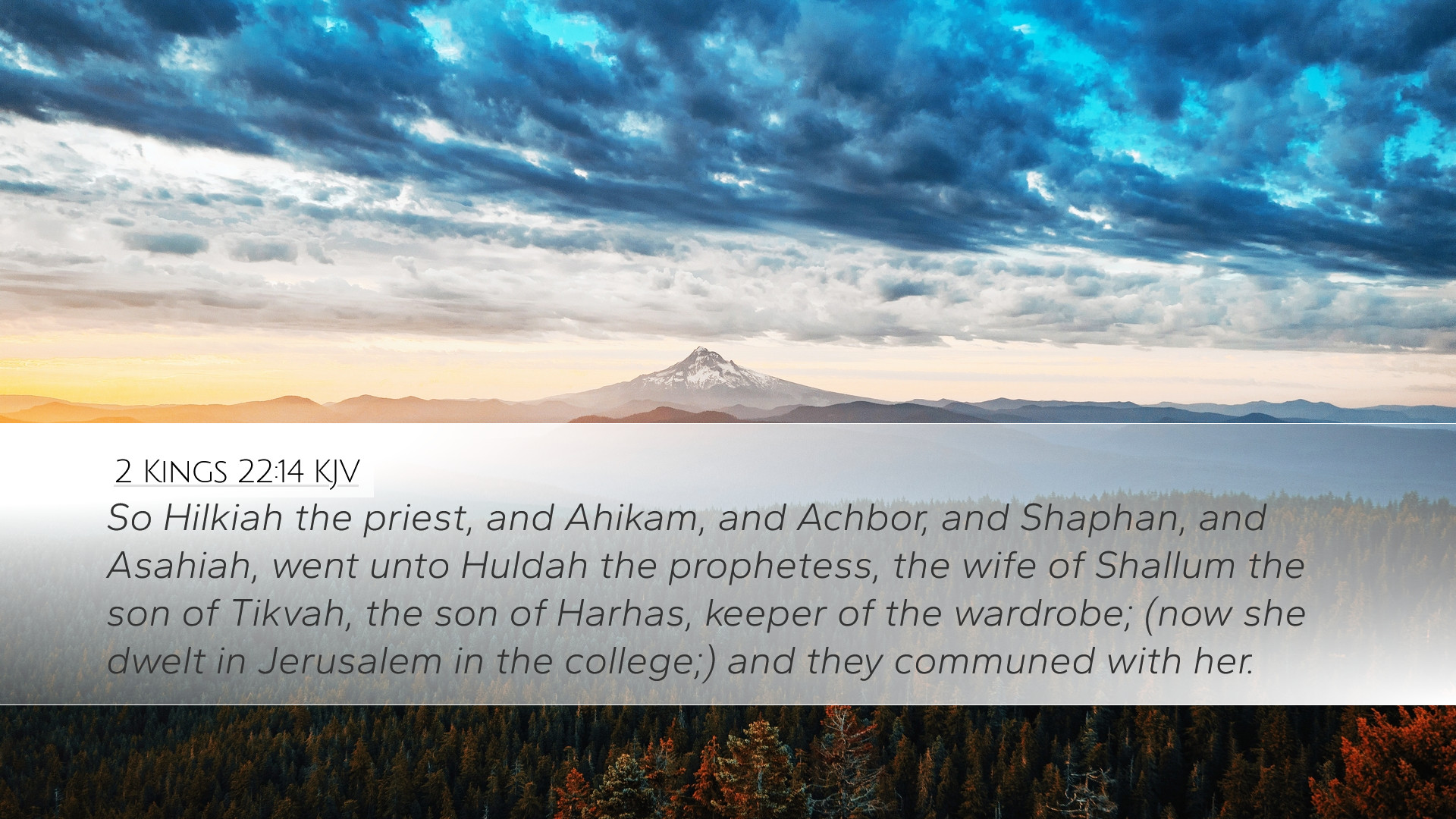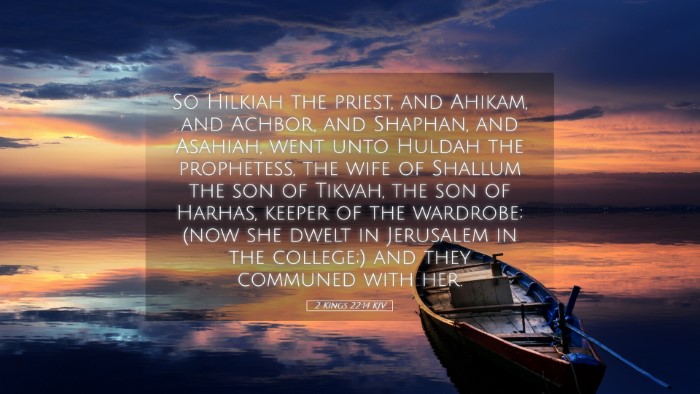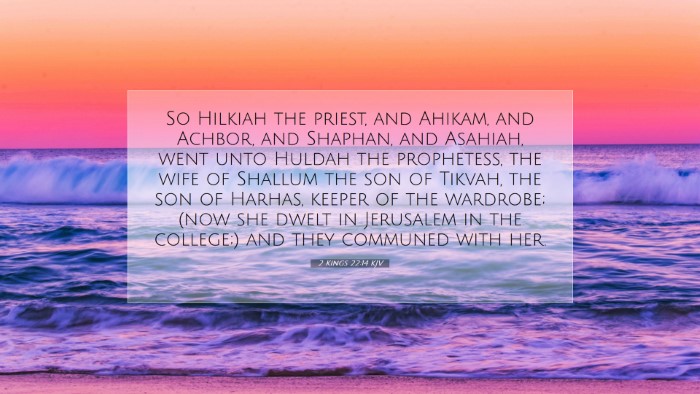Old Testament
Genesis Exodus Leviticus Numbers Deuteronomy Joshua Judges Ruth 1 Samuel 2 Samuel 1 Kings 2 Kings 1 Chronicles 2 Chronicles Ezra Nehemiah Esther Job Psalms Proverbs Ecclesiastes Song of Solomon Isaiah Jeremiah Lamentations Ezekiel Daniel Hosea Joel Amos Obadiah Jonah Micah Nahum Habakkuk Zephaniah Haggai Zechariah Malachi2 Kings 22:14
2 Kings 22:14 KJV
So Hilkiah the priest, and Ahikam, and Achbor, and Shaphan, and Asahiah, went unto Huldah the prophetess, the wife of Shallum the son of Tikvah, the son of Harhas, keeper of the wardrobe; (now she dwelt in Jerusalem in the college;) and they communed with her.
2 Kings 22:14 Bible Commentary
Commentary on 2 Kings 22:14
Text of the Verse: "So Hilkiah the priest, and Ahikam, and Achbor, and Shaphan, and Asaiah went unto Huldah the prophetess, the wife of Shallum the son of Tikvah, the son of Harhas, keeper of the wardrobe; (now she dwelt in Jerusalem in the college;) and they communed with her."
Introduction
The narrative found in 2 Kings 22:14 is pivotal for understanding the theological and historical context of the period leading to the reforms of King Josiah. Here, we examine the significance of the delegation sent to the prophetess Huldah, the implications of divine revelation through her, and the broader themes of prophetic influence in the Old Testament.
The Historical Context
During the reign of King Josiah, Judah had increasingly strayed from the true worship of Yahweh, influenced by previous kings who introduced idolatry and neglected the covenant. The discovery of the Book of the Law in the temple, described preceding this verse, spurred Josiah into action. The decision to consult the prophetess Huldah reflects a significant moment of seeking divine guidance in a time of crisis.
Insights from Matthew Henry
- Matthew Henry emphasizes the importance of consulting God’s prophets, particularly in times of national distress. This action signifies humility and a recognition of the need for divine direction.
- He remarks on Huldah's role as a prophetess, indicating that God can and does choose women for His purposes, thus underscoring inclusivity in divine communication.
- Henry notes that the delegation consisted of prominent figures, suggesting that seeking godly counsel is appropriate even for those in positions of authority.
Perspectives from Albert Barnes
- Barnes highlights the significance of Huldah’s location, stating that she dwelt in Jerusalem, a center of religious activity, thus making her counsel accessible to leaders. This is reflective of the necessity for associated counsel in spiritual matters.
- He further elaborates on the title 'keeper of the wardrobe,' which indicates Huldah’s position and the respect she held, suggesting that God’s messages can flow through unexpectedly privileged societal channels.
- Barnes also comments on the urgency of the king’s recognition of sin, paralleling the need for prophetic insight to reconcile the covenant violations faced by the nation.
Thoughts from Adam Clarke
- Adam Clarke interprets this encounter as a microcosm of divine providence, wherein God raises up voices in critical times. Huldah's acceptance signifies God's ongoing communication with His people.
- Clarke discusses the nature of prophecy and the personal yet authoritative nature of Huldah's words. He articulates that spiritual leaders, regardless of gender, express God's will and need to be heeded with seriousness.
- Moreover, Clarke notes the significance of prophecy in foretelling not merely event outcomes but the spiritual state of the people and their relationship with God, thereby situating Huldah within a broader theological framework.
The Role of Prophetic Counsel
This incident shows the pivotal role that prophets and prophetesses played in guiding God's people. Huldah's involvement is particularly noteworthy, reflecting that the divine wisdom is imparted through various vessels. The act of deliberation among the delegates and their subsequent consultation highlights a pattern observed throughout Scripture: when people find themselves spiritually adrift, they must seek out God’s representatives.
Theological Reflections
The intersection of authority and humility: By dispatching a group of prominent men to seek counsel from a woman, the text speaks volumes about the humility required to receive divine instruction. In light of the cultural context of which Huldah was part, this narrative challenges the status quo, promoting a view of shared authority in spiritual leadership.
The Importance of Community: The collaboration among priests and scribes to consult with Huldah illustrates that wisdom emerges from community engagement. This theme resonates throughout Christian theology that upholds the body of Christ's interdependence, where various members contribute to understanding divine truths.
Conclusion
2 Kings 22:14 serves not only as a historical account but also as a theological reflection on true leadership and communication with God. Further explorations through the insights of Henry, Barnes, and Clarke affirm that divine counsel is vital in guiding the faithful. The consultation practices, respect for prophetic voices, gender inclusivity, and communal decision-making all provide rich lessons for contemporary faith communities.


